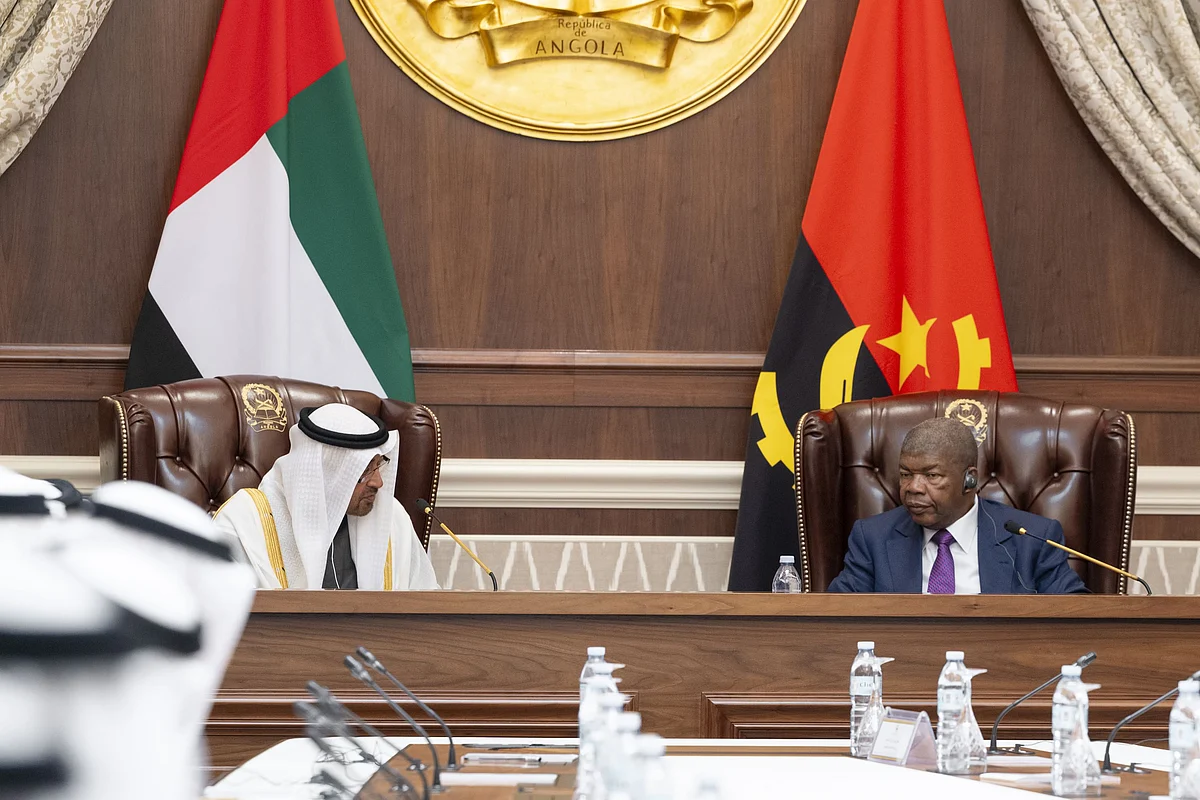
UAE-Angola Cepa To Boost Trade To $10 Billion Yearly By 2033: Al Zeyoudi
Dr Thani bin Ahmed Al Zeyoudi, Minister of Foreign Trade, affirmed that the Comprehensive Economic Partnership Agreement (CEPA) between the UAE and the Republic of Angola expands the UAE's ties with Sub-Saharan and West African markets - a high-growth region seeking to accelerate its development journey through strategic investments and partnerships.
In a statement to the Emirates News Agency (WAM), Dr Thani Al Zeyoudi noted that Angola is one of the most promising countries in the region thanks to its young population, abundant natural resources, and GDP growth of 4.4 per cent in 2024. He pointed out that this agreement builds on the current momentum in bilateral trade, particularly in sectors such as gemstones, minerals, mining, digital trade, and agri-tech.
Recommended For YouHe explained that Angola's strategic geographical location on the Atlantic coast of Southern Africa gives it the potential to become a pivotal logistics hub.
Regarding current trade and investment ties, Dr Al Zeyoudi said relations between the UAE and Angola, established in 1997, have witnessed significant progress. Non-oil bilateral trade reached $2.17 billion in 2024, marking 2.6 per cent growth compared to 2023. UAE non-oil exports to Angola stood at $135.6 million, while bilateral non-oil trade during the first half of 2025 amounted to approximately $1.4 billion - a 29.7 per cent increase over the same period in 2024.
The UAE's main imports from Angola in 2024 included diamonds, gold, copper bars, rods and alloys (worked and unworked), and grains - together accounting for 99.8 per cent of total imports. Key UAE exports to Angola included light petroleum distillates, iron and steel, taps and valves, metal structures and parts, cigarettes, and perfumes, comprising 50 per cent of the UAE's total exports to Angola.
Re-exports to Angola in 2024 mainly included large and medium-sized vehicles, diesel trucks, spare parts, and mechanical components, representing 50 per cent of total re-exported goods.
He emphasised that there are substantial opportunities to rapidly expand trade and investment ties in critical sectors such as energy, infrastructure, mining, logistics, tourism, and healthcare. He highlighted notable UAE companies already engaged in Angola. Abu Dhabi Future Energy Company (Masdar) is developing a 150 MW solar power project to provide renewable energy to around 90,000 homes, Dubai Investments is constructing the“Dubai Investments Park – Angola” over an area of 2,000 hectares and
AD Ports Group: recently began operating a multipurpose terminal at the Port of Luanda.
Dr Al Zeyoudi stressed that the CEPA with Angola is a key pillar in achieving the UAE's economic goals. Foreign trade is a main driver of growth, with the UAE aiming to increase the value of foreign trade to Dh4 trillion ($1.1 trillion) by 2031 and to double exports in the same period.
The agreement will contribute to these goals by eliminating or reducing tariffs, removing unnecessary trade barriers, opening markets for service exports, creating effective dispute-resolution mechanisms, and establishing a comprehensive framework for digital trade, he added.
He forecast that CEPA will increase non-oil bilateral trade to more than $10 billion annually by 2033, add about $1 billion to the GDP of both countries, and create nearly 30,000 new jobs. It will also reinforce the UAE's role as a global supply chain hub and a key link between the Arab world, Europe, Asia, and Africa.
The Minister added that the agreement is balanced and mutually beneficial. It allows for additional imports from Angola worth up to $993.6 million in products such as glass, fish, fruits, and optical goods, while providing opportunities to increase UAE exports by up to $235 million in products such as machinery, electrical equipment, plastics, rubber, ferrous metals, chemicals, and mineral products.
The agreement also enhances cooperation in services sectors including business, logistics, construction, engineering, healthcare, education, environment, finance, telecommunications, tourism, and travel. He noted that services account for nearly 40 per cent of Angola's GDP, making it the country's second-largest economic sector.
Dr Al Zeyoudi confirmed that the agreement will support SMEs by easing current trade restrictions and creating a platform for collaboration between support centres, incubators, accelerators, export hubs, and youth-, women-, and startup-owned projects. A dedicated committee will be established to equip this segment with the tools to seize new opportunities.
He concluded by stating that the agreement will enter into force once ratification procedures are completed by both countries. Upon implementation, immediate benefits will follow, including streamlined customs processes, reduced tariffs, and increased market access.

Legal Disclaimer:
MENAFN provides the
information “as is” without warranty of any kind. We do not accept
any responsibility or liability for the accuracy, content, images,
videos, licenses, completeness, legality, or reliability of the information
contained in this article. If you have any complaints or copyright
issues related to this article, kindly contact the provider above.


















Comments
No comment